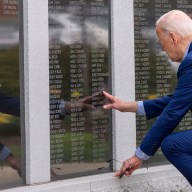Brian Borcherdt is relieved. His band’s new album is finally on the streets. “It’s like an annoying little brat of a child leaving for college,” he says, joking about Latin, Holy F—k’s latest effort.
The last time the Toronto-based electonica band released any new music was 2007. Since then, the group has gone from relatively obscurity to globe-trotting touring act.
“The last disc was a slow-burning record,” says Borcherdt. “We toured it for the last four years.”
But, being in a band like Holy F—k, which started as an improvisational live act, doesn’t mean they have to stick to a formula every night. With their various keyboards, pedals and noise machines, they can crank out any sounds they want.
“We don’t feel like we have to play a certain record,” he says. “We’re always playing new material and mixing it with old material. Even those songs have changed so much that we forget they’re old.”
While the band still improvises on stage, their albums, which were previously written on the fly, are now fully formed tunes.
“This record has more thought out ideas than anything in the past,” says Borcherdt. “We write things, craft them on stage and then bring them into the studio.”
While the new disc still has plenty of frenetic noise, clubby beats and discordant, drone-y electronica, it’s also softer and more atmospheric than previous discs. Some may miss the wild pace of their old songs, but this is clearly an album by a band. The songs are focused and clear — you can actually hear Latin America’s groovy rhythm track and spacey keyboard sounds, while the catchy SHT MTN sounds like a more traditional electro-pop rocker.
That tighter sound is a product of a once-loose lineup of players becoming an actual touring, money-making act. At one point they just played with whoever was around, but as more cities came calling, the group was forced to solidify their players and become an actual band.
“When we started, we wanted to share this band with anyone who was willing to play,” he says. “Any of our friends could join us. But then we became more about making records and touring, and you can imagine that it’s easier to do with an actual band than an imaginary one.”
But being a band isn’t enough. It helps to know what you’re doing. “We’ve gotten better at this,” says Borcherdt, who, like the rest of the group, got his start playing in rock bands. “When we started we didn’t know anything. It was more about plugging this thing and seeing how it feeds back. Now I know what’s going to happen when we do something to a mixer.”














